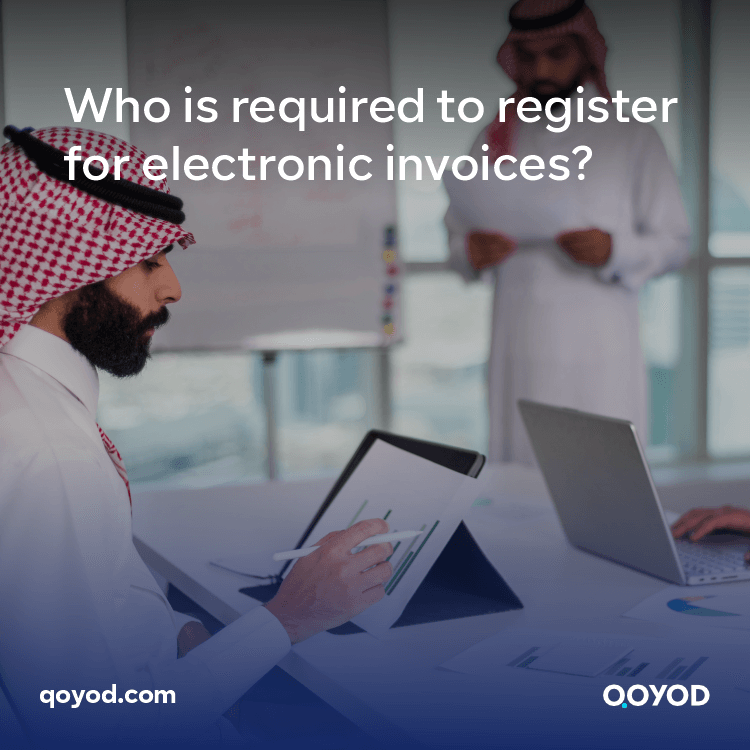In a world where technological progress is beyond the limits of perception and in a time of digital revolution that is radically transforming the ways of communicating and dealing, a new concept is emerging before us that captures the breath and reaches the depths of work and commerce:
It is the era of electronic invoices, as colored papers fade and traditional pens dissipate and are replaced by piles of elaborate digital data. In this advanced era, electronic invoices are a meeting point between modern technology and daily work, as they transform the usual traditional process of issuing invoices into a charming digital world that pulsates with creativity and influence. And if you are wondering, who are those who are bound by the electronic invoice? We will mention them successively in this article, and we will answer most of the questions on your mind. follow us.
Who is required to register for electronic invoices?
The electronic invoice system was implemented in the Kingdom of Saudi Arabia under a ministerial decision issued by the General Authority of Zakat and Tax. If you are wondering who is required to register for the electronic invoice,?
They are all companies of all sizes and types, whether they are companies with business (B2B) or government companies (B2G), or even if they deal with other companies with a tax record for business (B2B) or government institutions (B2G); they are also obliged to apply the electronic invoice. But for companies that deal with end customers (B2C) only, they are exempt from the invoice application and can continue to use traditional paper invoices. In practice, end customers are individuals with no tax record.
Note
Having learned who is obliged to register for the electronic invoice, These companies must register in the approved electronic invoice system, implement the procedures required to issue and distribute electronic invoices, and comply with the directives issued by the General Authority of Zakat and Tax to ensure compliance with the requirements of the electronic invoice.
Who is exempt from the electronic invoice?
The electronic invoicing system in the Kingdom of Saudi Arabia has been applied to all establishments, companies, and points of sale that are subject to value-added laws; however, there are some companies that are exempt from the electronic invoice according to the regulations of the Tax, Zakat, and Customs Authority, and the following is an overview of these categories:
Persons and establishments that import goods
Persons and establishments that purchase goods or services from outside the Kingdom are exempt from the electronic invoice.
Payments received from a taxable person
If payments are received from a taxable person who supplies goods or services that are exempt from VAT before the supply is executed, he does not need to apply the electronic invoicing system.
VAT-free supplies
Some supplies are designated as exempt from VAT in accordance with the laws of the Zakat, Tax, and Customs Authority, and therefore the application of the electronic invoicing system is not required on these supplies.
Supplies are subject to VAT according to the reverse charge mechanism.
Some supplies are subject to the reverse charge system, and the value-added tax is applied to the buyer instead of the seller, in which case the seller is not among those who are required to register in the electronic invoice, and this system does not need to be applied.
Requirements for registration in the value-added system
If you want to know whether your organization should implement VAT in the first place or not, you should review the following terms and requirements:
Annual Revenues of the Establishment
If your establishment’s annual revenue reaches or exceeds SAR 375,000, it becomes mandatory for you to register in the value-added system.
Enterprise revenues in the optional range
If the revenues of the establishment range between 187.500 Saudi riyals and 375.000 Saudi riyals, registration in the value-added system is optional, and the decision is up to the Board of Directors to determine whether it is necessary to join the system or not.
Annual revenue below the optional limit
If your establishment’s annual revenues do not exceed SAR 187,500, you are not eligible to register in the value-added system.
Requirements for choosing an electronic invoicing system
In addition, those who are bound by the electronic invoice must register and subscribe to a system that complies with the regulations of the Zakat, Tax, and Customs Authority and adopts many accounting programs and enterprise resource management systems of the Authority to facilitate compliance with the electronic invoicing system. Remember that when choosing an electronic invoicing system for your company, you must consider some important points, such as:
- Compliance with the Authority’s regulations: You must ensure that the system you choose complies with the Authority’s requirements and applicable tax laws.
- Ability to generate electronic invoices: The system must allow the possibility of issuing electronic invoices in an easy and efficient manner.
- Possibility of generating reports and financial statements: It should provide the possibility of generating accurate financial reports and assist in the analysis of relevant financial statements.
- Ease of use and integration: The system is preferably easy to use and integrates seamlessly with the systems used in the organization.
- Technical support and updates: Strong technical support for the system, such as periodic updates and subsequent developments, must be available to ensure the continuity and effectiveness of the system.
It is worth noting that Qoyod offers all of this and more at prices that suit everyone, so try it now.
Stages of application of the electronic invoice
The application of electronic invoicing goes through several stages, which can be summarized as follows:
First stage
The e-invoice has been applied to large and medium-sized companies in the Kingdom of Saudi Arabia since December 4, 2021, and e-invoice claimants include those whose total annual revenue from sales, tax services, or rents has generated SAR 40 million or more.
Second stage
The second stage starts on January 1, 2023, and this phase includes small businesses whose total annual revenue from sales, tax services, or rents is more than SAR 1 million.
Third stage
The third phase starts on January 1, 2024, and this phase includes SMEs whose total annual revenues from sales, tax services, or rents are less than SAR 1 million.
Note
All those who are bound by the electronic invoice must adhere to the dates specified for each stage, as well as register in the approved electronic invoice system and implement the required procedures to implement, issue, distribute, and present the electronic invoice to customers.
The importance of relying on electronic invoices with the Qoyod program
Companies and businesses live in an advanced digital age, as it requires efficiency, speed, and accuracy in all aspects of work. One of the most prominent aspects of business is the billing and financial collection process, and here comes the role of the electronic invoicing program as a smart solution to achieve digital transformation in this field.
Reliance on technology
Electronic invoicing is a quantum leap in billing and account management processes, as it replaces traditional printed invoices with electronic invoices sent and received over the Internet. It is worth noting that the Qoyod program relies on modern technology, such as strong software and secure encryption of information, which ensures the exchange of data in a secure and fast manner.
Tracking of payment statuses
In addition, Qoyod software enables tracking of e-invoice claimant payments, easy review of financial reports, monitoring of paid and overdue invoices, and generating comprehensive financial reports that provide valuable insights into the collection process.
Save time and effort.
One of the main benefits of the electronic invoicing program is saving time, effort, and costs, as it reduces the need for paper, printing, and traditional mail, which contributes to preserving the environment and reducing practical costs. It also contributes to improving business relationships with customers, as it provides them with a convenient and simplified experience to pay bills.
Conclusion
At the end of our talk about who is obligated to the electronic invoice, we must remember that the transition to electronic invoices is an important step towards improving business processes and developing the commercial sector in general. When we talk about electronic invoice claimants, we are talking about a wide range of parties that benefit from this modern and innovative system. In the first place, individuals and SMEs benefit from the many benefits offered by the electronic system. Instead of relying on traditional paper invoices, they can now easily and efficiently create and send invoices online, thus allowing them to save time, effort, and financial resources that can be invested in other areas that promote their business growth.
Adopt electronic invoices with the Qoyod program as part of your financial and business future. It is not just a paper required to finalize business deals but rather a tool that promotes economic development and contributes to building more advanced societies and development. It is worth noting that the Qoyod program offers all its customers: electronic invoice systems, as well as the point of sale system, stores, customers, etc., making it the best accounting program in the Arab world.
After you know who the e-invoice claimants are, try Qoyod now for free for 14 days and take a bold step towards a more effective and orderly financial future with an integrated accounting program.




